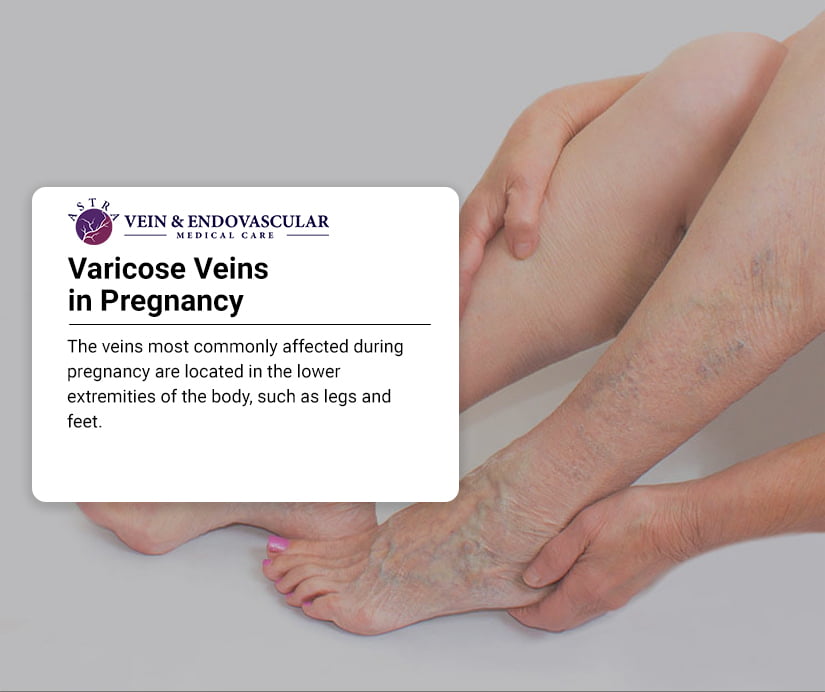
Bulging and painful leg veins are a normal part of pregnancy for many women. They result from the excessive pressure to the large vein that carries blood back to the heart from feet and lungs as the baby grows in the womb. If your bulging veins turn painful and itchy and become uncomfortable, seek medical help to ensure they are not a sign of some underlying medical condition. Dr. George Bolotin at the Astra Vein Treatment Center uses the most advanced equipment and screening tests to identify your symptoms accurately and provides the best treatment and management options considering your delicate condition.
The veins most commonly affected during pregnancy are located in the lower extremities of the body, such as legs and feet. Mothers-to-be suffer from bulging and painful leg veins as pregnancy increases blood volume in the body and slows the blood flow from the legs to the pelvis. This change in the circulation supports the baby’s growth and prepares the body for labor and delivery, but it can also result in enlarged veins in the legs accompanied by swelling and pain.
Bulging veins in pregnancy can also be a sign of venous insufficiency or even an unidentified medical condition. Also, there is a general association between varicose veins and the risk of deep vein thrombosis (DVT) or blood clots that can be serious if not taken care of timely. If left untreated, the clot could also break away and travel to the lungs, causing a life-threatening condition called pulmonary embolism. If you experience shortness of breath, painful breathing, cough, and rapid heartbeat, seek immediate medical assistance.

Bulging veins result from weak or damaged valves in the veins. Veins carry the blood from the body back to the heart. Veins have valves that act as one-way flaps to prevent blood from flowing backward as it moves up the legs. If the valves become weak, blood can leak back into the veins and collect there, making the veins bigger and swollen.
Sometimes varicose veins result from multiple pregnancies, but it could also be hereditary. Women whose mothers also suffered from varicose veins are more likely to develop them. Whether varicose veins are hereditary or caused by circulatory changes in pregnancy, you can prevent worsening your condition with little care and expert advice. Schedule an appointment with your doctor to know which varicose vein treatment will work best for you.
Some women do not suffer from enlarged veins until later in pregnancy, while others have to face these problems from the beginning due to hormone changes. Varicose veins that develop during pregnancy generally get better without requiring treatment within 6 to 12 weeks after the baby is born.
If varicose veins continue to cause pain and swelling, you must consult a doctor to get them checked.
Varicose veins are not a threat to you or the baby, but if you suffer from excessive swelling or discomfort, specific treatments can provide relief until birth.
The vein doctor will carefully examine your legs, may even run some tests like vein screening or blood works to find out the reasons behind your symptoms.
Doctors recommended options to treat leg veins popping out during pregnancy include:
Bulging veins are not unusual in pregnancy, but women who already suffer from varicose veins find their condition worsening during this time. The legs feel heavy and achy, and the surrounding skin also feels itchy or throbbing. In most cases, these painful symptoms disappear after the baby is born and the hormone levels become normal. Consulting a doctor and seeking treatment can help you find relief from the irritating symptoms and enjoy a comfortable pregnancy.
Pregnancy is supposed to be a happy time when you prepare to welcome your baby into the world. Visit a vein specialist to have your condition properly diagnosed and treated and avoid developing venous insufficiency complications or other severe complaints during or after the pregnancy.
During pregnancy, commonly faced vein symptoms include swelling, pain, bleeding, or a superficial blood clot in the varicose vein. Consult a doctor immediately if your varicose veins and the surrounding area become warm, get red and very painful, or begin to bleed to get the best treatment. Yours and the baby’s health are very important, and you must seek professional medical care.
During pregnancy, the uterus exerts pressure on the inferior vena cava, the vein that transports blood from legs and feet to the heart. If the vena cava is restricted, due to any reason, blood begins to pool in the feet and legs that lead to varicose veins and other venous conditions accompanied by swelling, pain, or spider veins. You can manage the pain and discomfort caused by expanding veins with your doctor’s help and guidance.
Your doctor may recommend the following to manage painful bulging leg veins during pregnancy:
Do not waste time visiting a doctor if your condition aggravates or you develop new symptoms to avoid any complications.
If your varicose veins do not get back to normal even after pregnancy, safe and effective treatment options can fix them.
Do not wait till your veins become even more swollen, painful and your condition worsens. Schedule a consultation with Dr. George Bolotin at the Astra Vein Treatment Center to have your condition diagnosed, manage your symptoms, seek relief, and get your legs back in shape. With a wide variety of tried and tested vein treatment options, you can look forward to getting the best advice to make your pregnancy comfortable and pain-free.
Vein & Vascular Medical Care
4209 Ave U, Suite A.
Brooklyn, NY 11234
(347) 934-9068
Vein & Vascular Medical Care
869 E Tremont Ave
Bronx, NY 10460
(929) 447-4563